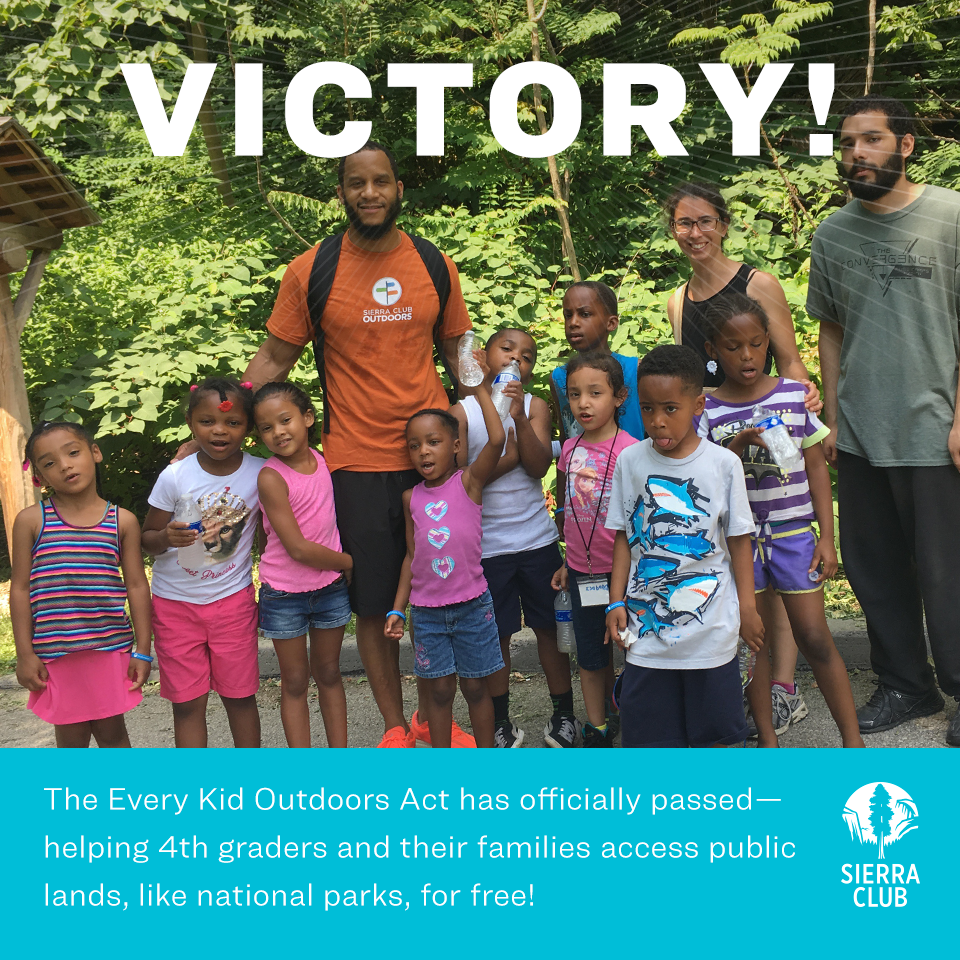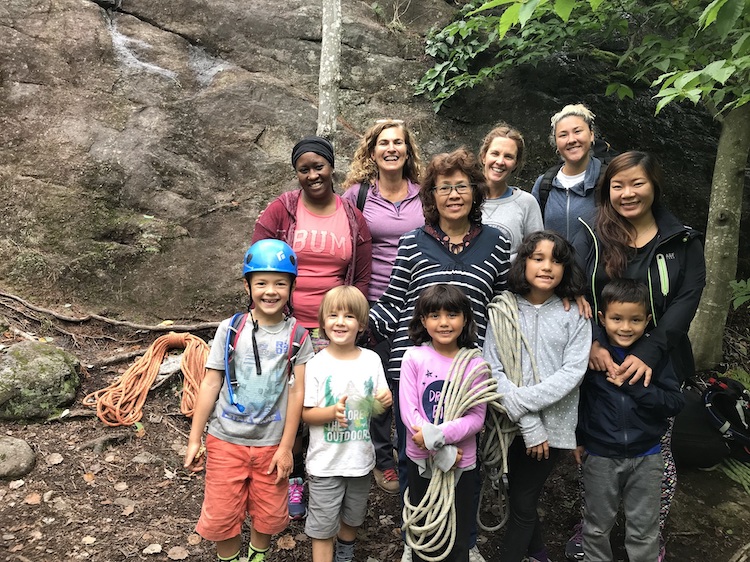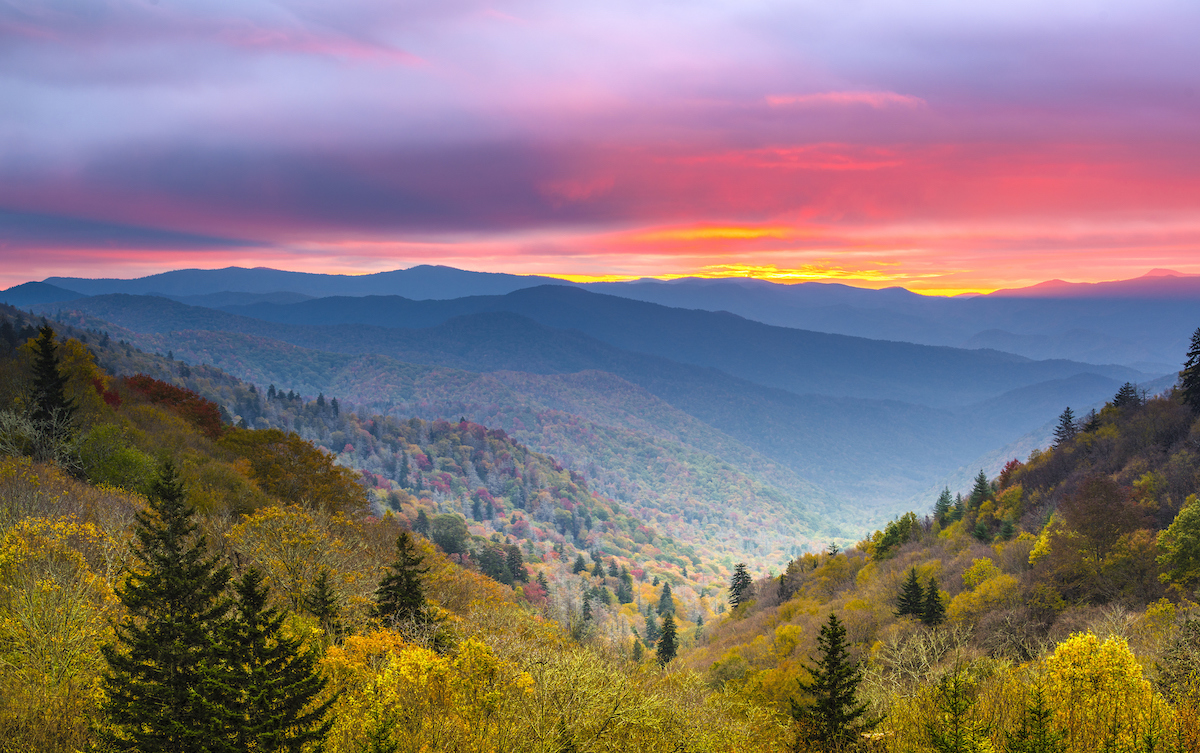In 2019, Sierra Club Outdoors changed its name to Outdoors for All to signal our commitment to centering principles of equity, justice, and inclusion in every aspect of our work. Organizationally, we’re at the beginning of a long journey: In 2019, we completed an Outdoors for All theory of change that charts a new course for our work. Part of that work will be to elevate a new narrative of access to nature as a basic human right.
Unfortunately, far too many communities suffer from polluted air, contaminated water, and a lack of access to open spaces. Fewer than half of all people in the US live within walking distance of a park, and the greatest disparities in access are found in low-income neighborhoods and communities of color. For those without cars or reliable public transportation, access to parks and open spaces is even more limited.
The problem is greater than just physical access: Our country’s and the conservation movement’s long history of racism and exclusion have prevented many people of color from feeling welcomed, valued, or safe in our national parks and public lands. This legacy of racism lives on. We see it in the news time and again: White woman calls police or pulls gun on black family picnicking in a park.
Much of what Outdoors for All achieved in 2019 was about advancing policies to level the playing field for outdoor access and building mutually transformational partnerships. Here are just a few of the ways we helped to make a big difference in 2019:
Nationally, we partnered with members of the Outdoors Alliance for Kids to secure access to our national parks and public lands for nearly four million children by successfully advocating for the passage of the Every Kid Outdoors Act, which authorizes the Every Kids Outdoors program for seven years. The program provides free entry to our national parks and public lands to fourth graders and their families.

Passage of the Every Kid Outdoors Act was the result of a multiyear and multifaceted campaign that began with dozens of Outdoors Alliance for Kids partners supporting the initial program when it was first established in 2015, defending the program against the Trump administration's attempts to phase it out, and securing its continuation by passing bipartisan federal legislation. This victory would not have been possible without partners, staff and volunteers across the country who led Every Kid outings; more than 75,000 grassroots comments to the administration and Congress; and the engagement of dozens of partner organizations to help bring attention to the program, including by adding the voices of fourth graders to the campaign.
We also piloted a national youth essay contest with Scholastic and Outdoors Alliance for Kids that inspired 2,000 children to write stories about why the outdoors matters to them (you can read the winning essays in Sierra magazine).
In the field, we helped tens of thousands of young people and veterans experience nature this year through Sierra Club outings and programs (shout-out to the incredible network of Inspiring Connections Outdoors (ICO) and Military Outdoors (SCMO) volunteers).
In Chicago, ICO is focusing on marginalized communities most affected by climate change, environmental pollution, and other societal factors. As President Trump continues to fuel an anti-immigrant national discourse through a racist and xenophobic political agenda, our partners in the Latinx immigration community face increasing anxiety and fear. Our Chicago ICO team is responding to requests for intergenerational outings with a focus on health and overall well-being. Chicago ICO is developing many best practices for responding to partners and serves as a model for how we can grow the program in both quality and quantity. In Chicago, we now have 20 volunteer leaders, 11 partner organizations, and reach 700 participants annually, up from just 200 prior to staffing the program.
In Detroit, our team is supporting local partnerships to address the need for nearby green spaces and expanding equitable access to nature for kids and families. The Detroit Outdoors collaborative just celebrated two years of camping, having activated Scout Hollow, the city’s only campground, trained 80 leaders (meet Ajee Witherspoon), and ensured that nearly 500 young people had an opportunity to sleep under the stars. Detroit Outdoors brings together the Sierra Club, YMCA of Metro Detroit, Detroit Parks and Recreation, and many other partners to ensure that the children of Detroit have every opportunity to benefit from a connection to nature.
At the federal level, we’re also working to advance the Outdoors for All Act which would help protect and enhance places like Scout Hollow and expand park access in low-income communities.
In Georgia, our team started a new Military Outdoors outings group in Augusta and built important partnerships with local veteran’s centers. On Indigenous Peoples Day, SCMO and ICO cohosted a hike in Tallulah Gorge State Park in northern Georgia along with the International Rescue Committee and a group of high school-aged refugees. Collectively, our team led more than 15 outings, trained 30 new leaders, and connected more than 200 veterans with outdoor opportunities in the region.
In Los Angeles, the Sierra Club -- along with our partners in the Nature for All coalition -- has spent the past ten years listening, learning, and supporting communities to realize their vision for a protected San Gabriel Mountains National Monument. Through outings and grassroots organizing, we’re now making sure that kids and communities in the San Gabriel watershed have every opportunity to visit these protected lands. In 2019, the coalition launched the All Aboard for Nature project, which introduced hundreds of riders to guided transit to parks adventures and created new community resources to help ensure more people could safely and affordably access local natural areas.
This collaborative work in Los Angeles also laid the foundation for the federal Transit to Trails Act, which would create more resources for public transit to public lands projects.
In New York City, we helped single moms who have served in the miltary build an outings group that serves mothers and children. One of our leaders, Charmaine Tillet, suffers from post-traumatic stress disorder, but through outings with the female veterans outing group, she was able to become part of a community where she felt safe and accepted. The outings our Military Outdoors team developed in the city have also led to connections with local Veterans Affairs hospitals that now routinely recommend Sierra Club outings to veterans coming through their doors. And in 2019, this work was recognized by state decision-makers, who reached out to the Sierra Club to guide the development of new policy recommendations to connect veterans with public lands across New York. In 2020, we expect to engage on Outdoors Rx legislation that would connect New York veterans with nature.

Charmaine and the other members of the veteran single mothers outings group
In Philadelphia, we’re collaborating with partners to ensure opportunities for youth and veterans to experience nearby nature -- and pushing back on efforts to reduce access to the outdoors. For example, in 2019, the Delaware Water Gap (DWG) National Recreation Area released a draft of a plan to raise entry fees to $25. The Sierra Club’s Pennsylvania Chapter led the opposition to these fee hikes, and the Outdoors for All team was able to support this effort by engaging the Atlantic Chapter (NY), and providing opportunities for youth and veterans from a previous paddling trip in the DWG to get involved. Collectively, the team elevated hundreds of voices in opposition to the proposal, which would price low-income communities out of visiting the national recreation area. A similar effort to privatize campgrounds at the national level earned our pushback as well.
In 2019, we also worked to empower outings leaders and participants as advocates for the environment and champions for justice. When the Sierra Club was invited to participate in the YMCA’s 175th anniversary youth conference, we used the opportunity to pull together a delegation of youth leaders who could lend their insights and expertise to the Y as it seeks to take on a global environmental agenda.
The Sierra Club’s Military Outdoors team spent 2019 helping veterans use their leadership skills to defend the lands and people they served to protect. Earlier this year, eight veterans and two leaders from the Tohono O'odham Nation joined our staff to camp at the National Butterfly Center in Mission, Texas, and spent a week getting to know the people and lands affected by Trump’s border wall. The team’s goals were to bear witness to injustice; use their status as veterans to amplify the perspectives of border communities; showcase powerful, peaceful public opposition to the border wall; and build an action team of veteran leaders willing to mobilize for future opportunities. Our team succeeded in providing a unique voice and helped contribute to a larger multiyear campaign to protect border lands and communities.
Veterans visit the Texas borderlands.
A great example of the impact of our Military Outdoors program is the story of Army Veteran Karla Terry (top row, second from the right in photo above), who got involved with Military Outdoors in 2011 after suffering from alcohol addiction. She credits the Sierra Club with saving her life. In 2019, she gave back in a big way by joining the fight to protect the Arctic National Wildlife Refuge, by participating in the National Butterfly Center outing, and even by visiting Washington, DC, as part of a nationwide fly-in to advocate for the Accelerating Veterans Recovery Outdoors Act, our SCMO team’s legislative priority to expand public health benefits to the veteran population through time outdoors.
We’ve made quite a bit of progress in 2019, but we’re just getting started. We’ve got a long way to go on our journey to transform ourselves so that we can better support the movement for justice, equity, and inclusion in the outdoors. In 2020, we’ll begin moving major strategies from our theory of change forward as we continue advancing impactful programs and deepening critical partnerships that support partners, empower advocates, change lives, and center our values. And we’ll keep fighting for a proactive and bipartisan policy agenda that ensures all communities can benefit from time in nature.
